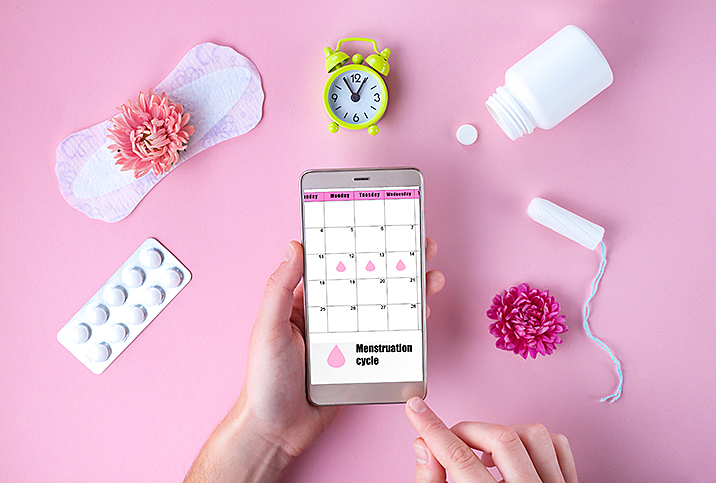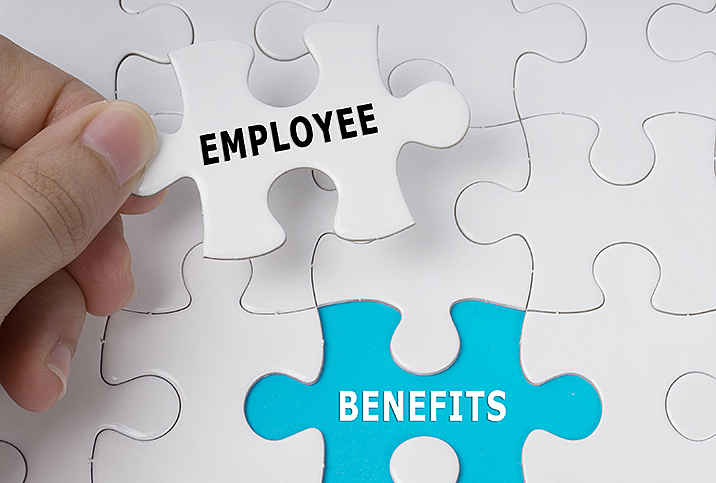The Importance of a Period-Inclusive Workplace

The side effects of periods, especially when compounded by underlying conditions such as polycystic ovary syndrome (PCOS), can be debilitating. Cramps, bloating, fatigue and nausea can hinder your ability to think clearly and be productive at work. When these symptoms are the result of illness, they're considered valid reasons to need accommodations. So why are period symptoms still largely considered an invalid reason to need accommodations in the workplace?
The answer, unfortunately, is that there is still societal shame and stigma associated with menstruation. Even though periods have been around since the beginning of time and affect half of the population, talking about them openly is still at least somewhat taboo in many social situations—especially the workforce.
Twenty-three percent of women reported taking time off work within the previous six months because of their periods. Of those, 36 percent said they had lied about why they were unable to work, according to a 2017 study of 2,000 women by Bupa, an international health insurance company. Common excuses for missing work included colds, flus and stomach bugs.
"I communicated to my employer once when I initially began employment and was told, 'Just take some Midol, we need you,'" said Renee Trewella, B.S.N., a registered nurse in Louisiana. "That internalized shame is what kept me from ever communicating the reason for using any kind of sick time."
Periods are nothing to be ashamed of, nor is needing accommodations for them from employers. Let's take a look at some ways workplaces can be more period-inclusive.
Offer paid sick leave and remote work options
If you live in the United States and you've heard or said the phrase, "I can't afford to be sick," it's because there is no federal law mandating companies to offer paid sick leave.
It's important to offer paid sick leave, and it's just as important to acknowledge periods as a valid reason to use it. The belief that periods aren't a valid reason to take time off work is pervasive and affects everyone, regardless of symptom severity or compounding medical issues.
"Periods are 'just part of life' and not 'a real reason to take off,'" Trewella said. "I'll admit that I'm still working to dismantle this internalized misogyny."
It's important to offer paid sick leave, and it's just as important to acknowledge periods as a valid reason to use it.
Without paid leave and support, people may choose to suffer through period symptoms at work because not only do bills need to be paid, but they also feel they won't be taken seriously by their employers.
"I have oftentimes wanted to stay out of work because of my heavy flow and didn't, because I've been afraid that that wouldn't be a socially acceptable excuse to my co-workers or management, especially since it is [a] monthly occurrence," said Jennifer, a registered nurse in West Georgia who requested her full name not be used. "Not to mention, one day of work for a lot of nurses is typically 12 hours. I would be missing 12 hours of work without pay."
In addition to paid sick leave, remote work options should be offered where applicable. Though remote work might not necessarily be an option for people in the medical field, it's an option in many other fields. This has been a proven approach during the COVID-19 pandemic, which caused many companies to go remote, quickly and often indefinitely. Many major companies have announced plans to make remote work options permanent. Working remotely can be easier for people on their periods because it allows them to be more comfortable and have easy access to the supplies and remedies they need.
Provide period products in all restrooms
Most people who have periods have experienced the annoyance and embarrassment of starting their periods at work or school. Issues such as hormone imbalances, polycystic ovary syndrome (PCOS) and endometriosis can make periods irregular, so sometimes, people are caught off guard with no supplies. Companies can be considerate of this by offering free period supplies in restrooms. Additionally, it would benefit people in fields with specific uniforms to have clean uniforms on standby in cases of bleeding through.
"In addition to postpartum pads and mesh panties, if I bleed through my scrubs, I can easily go and change into another set," Jennifer said. "All of our scrubs are provided for us. Having panties, pads and clean scrubs available for all employees working in this setting could be a start at making it more inclusive."
It's also important to note that while periods are still often thought of as solely a woman's issue, that is not the case. All people with uteruses can potentially have periods, and it's just as important to be inclusive of trans and nonbinary people when providing period products in the workplace.
"If I were a transgender man, I may not be able to work in the environment that I work in for fear of bleeding through and then being found out," Jennifer said. "Or I would be frequently calling out or trying to arrange my schedule around my periods if my periods were predictable enough to do so. Unless, of course, I felt comfortable, safe and trusted the people that I work with to know that I was transgender and not feel shamed for it."
To take it a step further, gender-neutral bathrooms can help trans people feel safer and more comfortable when tending to their periods at work.
"Workplaces can also have gender-neutral bathrooms so that trans persons who menstruate don't have to feel ashamed," Trewella agreed. "They're simply 'going to the restroom.'"
Period inclusivity benefits all
The bottom line is that periods exist and sometimes hinder a person's ability to complete daily tasks. Though they can be a personal burden, they shouldn't be treated as such in the workplace. When companies dismiss the needs of people with periods, they're dismissing a large segment of the population that has valuable insight and experience to offer them.
The tides are shifting, and people are less willing than ever to tolerate mistreatment at work. If a workplace doesn't accommodate the needs of people with periods, its employees may just go find one that does.

















